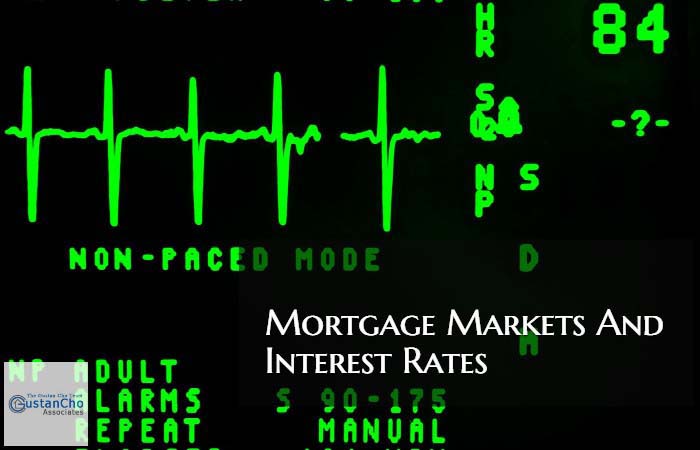This guide covers the mortgage markets and interest rates. The mortgage markets and interest rates have seen volatile trends in recent weeks. The first and foremost is rising interest rates when analyzing mortgage markets and interest Rates. John Strange, a senior loan officer at Gustan Cho Associates and an associate contributing editor at GCA Forums says the following about the mortgage markets:
Ultimately, in order for an economy to grow in a fractional reserve capitalistic economy, you need some level of inflation.
Short term inflation can be dangerous for sudden upticks in the pricing of food, fuel (not included in the core inflationary index), borrowing, these sudden changes can make life very difficult for families on limited residual income. In this article, we will discuss and cover the overview of mortgage markets and interest rates.
Long Term Inflation Mortgage Markets and Interest Rates
Long term inflation is necessary and can be reflected in higher long-term borrowing such as 10–30-year bonds. What are bonds?
- They are debt instruments
- Some investment firms use bonds to create capital by securitizing debt
- This is done with a promise to pay the full amount back at a later date with semi-annual interest earned along the way
Bonds are used to creating capital for corporations, for public projects, for government liquidity to pay current obligations, and for riskier ventures like technology, medical research, casinos, etc.
Risk Levels on Bonds
The riskier the bond is to pay back, the higher the interest rate of return. Risk versus rewards concept. Governments are seen as the safest investments. Especially on the federal side because they have the ability to both raise taxes and print money. Bonds, in general, are more desirable as an investment. This because in case of bankruptcy of a corporation or just a dividend payout, in general, the bond investors will get their money back before stockholders do. What does this mean to the conversation of mortgages?
Start Your Process Towards Buying A Home
Apply Online And Get recommendations From Loan Experts
Bonds and Mortgage Markets
When interest rates rise, investors who own bonds see the underlying value of their investment lose face value. Inflation or a rise in interest rates does exactly that. Rising rates will raise the value of the dollar. But will hurt the purchasing power at the same time since the growth of businesses is largely based on their ability to borrow and leverage. Dale Elenteny, a senior loan officer and associate contributing editor at GCA Forums, says the following about the mortgage markets:
When their cost of borrowing goes up, their cost of business goes up since they have to charge ore to recoup the interest they pay on loans. The government is the same way.
For instance, when states like Illinois or California or Rhode Island get downgraded as an investment because of repayment risk, that is due to their debts being higher than their income.
Mortgage Markets Out of Control Due To Inflation
Just like a citizen, they must now pay a higher interest rate to investors when they borrow money to pay for things like pension obligations, which also go up. This causes a rise in taxes, and regulatory costs since those municipalities must increase the cost of business to pay the higher cost of the benefit
This is one of the main reasons cities are so expensive. Less space, fewer resources, and too many benefits to citizens raise the cost of living, as they attempt to raise the standard of living. Most businesses and cities that are insolvent don’t have a cash problem, they have a cash flow problem
Mortgage Markets and Interest Rates
By December 25, 2024, substantial transformations have been observed in the mortgage market due to recent economic shifts and the implementation of new policies. Below is a breakdown of the existing conditions and future estimations:
Current Mortgage Rates
30-Year Fixed-Rate Mortgages:
- The mortgage rate recently crossed the 6.72% mark, an increase from the previous week’s 6.6%.
- This was the highest increase recorded since late November.
15-Year Fixed-Rate Mortgages:
- The 15-year fixed-rate mortgage market also experienced a surge.
- The average percentage rate hit 5.92%, compared to last week’s 5.84%.
Factors Influencing Current Rates
Federal Reserve Policies:
- The Federal Reserve’s rate cuts, aimed at improving affordability, have led to increasing mortgage rates, which is odd.
- This is due to the surge in yields, which average around 10-year treasury bonds and immensely impact mortgage rates.
Economic Indicators:
- Major budget deficits and high inflation have increased the demand for long-term interest rates.
Housing Market Trends
Existing Home Sales:
- November reported existing home sales at a record high; from March’s 4.15 million sales, a 4.8 % increase was seen.
- Compared to June 2021, it stood at a staggering 6.1% growth yearly.
Home Prices:
- Despite seeing growth in home prices nationally, which crossed $406,100, along with a 4.7% increase from last year, the current pace of sales indicates a market in the midst of recovery.
Forecast for 2025
Investment Market Snapshot
Mortgage Rate Predictions:
- Lenders predict a gradual drop in mortgage rates through 2025.
- According to Fannie Mae, the 30-year fixed mortgage will start the year with a 6.5% rate and lower it to 6.2 by the end of the year.
Market Movement:
- Even though rates are dropping and buyer requirements are met, the preparedness house markets for the year are predicted to remain quite restrained, considering the key issues of housing affordability and stock shortages in the property market.
Borrowers
Housing Cost Hurdles:
- Raised interest rates have obstructed many potential buyers struggling with additional high interest rates.
- Mortgage Applications remain unchanged.
Unclear Economic Outlook:
- The possibility of future interest changes is apparent, considering various policy possibilities and market fluctuations.
- Therefore, it is always advised to be on the lookout and consult specialists before making plans.
In conclusion, albeit modestly, the mortgage market will ease its interest rates within 2025. Several economic factors and weaknesses in the market, alongside additional policies, will likely be a sizeable tailwind for the housing market.









